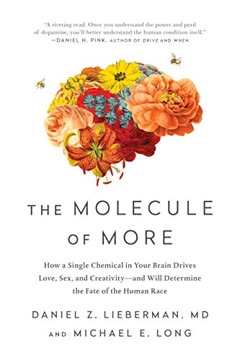Key Takeaways
1. Depression is rooted in brain biology, but neurobiology can be reshaped
"If exercise could be packed into a pill, it would be the single most widely prescribed and beneficial medicine in the nation"
Depression is biological. It results from disrupted communication between the brain's thinking, feeling, and action circuits. This involves key regions like the prefrontal cortex, limbic system, and striatum, as well as neurotransmitters such as serotonin and dopamine.
Neuroplasticity offers hope. While depression has biological underpinnings, the brain's neurobiology is malleable. Through various interventions, it's possible to reshape neural circuits and alter brain chemistry to alleviate depressive symptoms. This concept reduces stigma and empowers individuals to take an active role in their recovery.
Multiple factors influence depression:
- Genetics
- Early childhood experiences
- Current life circumstances
- Stress levels
- Social environment
- Habits and behaviors
2. Physical activity is a powerful antidepressant, boosting mood-regulating neurotransmitters
"Exercise has a synchronizing effect on your circadian rhythms and reduces stress, leading to improved sleep."
Exercise impacts multiple brain systems. Physical activity boosts serotonin, which improves mood regulation and willpower. It also increases dopamine, enhancing motivation and pleasure. Additionally, exercise reduces the stress hormone cortisol and increases brain-derived neurotrophic factor (BDNF), which promotes neuroplasticity.
Start small and build consistency. The key is to begin with manageable amounts of activity and gradually increase. Even 10 minutes of moderate exercise can improve mood and energy. Aim for 3-5 sessions per week of 45-60 minutes for maximum antidepressant effect, but any amount is beneficial.
Exercise benefits:
- Improves mood and energy levels
- Reduces stress and anxiety
- Enhances sleep quality
- Decreases pain perception
- Boosts self-esteem and confidence
- Provides structure and routine
3. Breathing exercises and body awareness can calm the nervous system
"By changing your patterns of breathing, you're changing the information being sent, which can affect numerous brain regions as well as areas of the body."
Breath is a powerful tool. Conscious breathing exercises can shift the nervous system from fight-or-flight mode to a calmer rest-and-digest state. This reduces anxiety, lowers stress hormones, and improves heart rate variability – a measure of the body's ability to handle stress.
Body awareness promotes relaxation. Practices like progressive muscle relaxation and mindful body scans help reduce physical tension and emotional stress. These techniques activate the insula, a brain region involved in interoception (awareness of internal bodily sensations), which can improve emotional regulation.
Key practices:
- Slow, diaphragmatic breathing
- Progressive muscle relaxation
- Body scan meditations
- Mindful movement (e.g., yoga, tai chi)
- Attention to posture and facial expressions
4. Quality sleep is crucial for mood regulation and cognitive function
"Sleep isn't just a time for your brain to turn off. There's actually a lot happening, even though you're not aware of it."
Sleep impacts multiple brain systems. Quality sleep is essential for regulating mood, reducing stress, supporting healthy habits, decreasing pain, and improving cognitive function. It affects neurotransmitter systems, removes metabolic waste from the brain, and helps consolidate memories.
Improve sleep hygiene. Establishing consistent sleep habits can significantly impact depression symptoms. This includes maintaining a regular sleep schedule, creating a relaxing bedtime routine, and optimizing the sleep environment.
Key sleep hygiene practices:
- Stick to a consistent sleep schedule
- Create a dark, quiet, cool sleeping environment
- Avoid screens before bedtime
- Limit caffeine and alcohol intake
- Exercise regularly (but not too close to bedtime)
- Practice relaxation techniques before sleep
5. Social connections are vital for mental health and emotional well-being
"Humans evolved in tribes. We feel best when we belong."
Social connection is a basic need. The human brain evolved to rely on social bonds for survival and well-being. Social interactions release oxytocin, which reduces stress and promotes feelings of trust and bonding. Loneliness and social isolation can significantly worsen depression.
Nurture relationships actively. Even when depression makes socializing difficult, maintaining and building connections is crucial. This can involve reaching out to existing support networks, joining groups with shared interests, or seeking professional support.
Ways to enhance social connection:
- Schedule regular check-ins with friends and family
- Join clubs or groups aligned with your interests
- Volunteer for a cause you care about
- Participate in support groups
- Practice active listening and empathy
- Engage in acts of kindness and generosity
6. Setting achievable goals and making decisions can boost motivation and self-esteem
"Happiness is best achieved when the habits in the striatum and the goals directed by the prefrontal cortex are aligned."
Goals activate reward circuits. Setting and working towards goals engages the brain's dopamine system, enhancing motivation and a sense of purpose. This process involves the prefrontal cortex (planning) and the striatum (habit formation and reward).
Start small and build momentum. Break larger goals into smaller, achievable steps. Each accomplished task provides a dopamine boost, reinforcing positive behaviors and building self-efficacy.
Effective goal-setting strategies:
- Make goals specific and measurable
- Set realistic timelines
- Write goals down and track progress
- Celebrate small victories
- Adjust goals as needed
- Focus on the process, not just outcomes
- Use "if-then" planning for potential obstacles
7. Mindfulness and acceptance reduce emotional reactivity and stress
"Mindfulness is a process of guiding your attention to something specific instead of being a slave to wherever your attention happens to wander."
Mindfulness changes brain activity. Regular mindfulness practice strengthens connections between the prefrontal cortex and the limbic system, improving emotional regulation. It also reduces activity in the default mode network, associated with rumination and self-referential thinking.
Acceptance complements mindfulness. Accepting things we cannot change reduces the stress of constantly trying to control uncontrollable situations. This doesn't mean resignation, but rather a non-judgmental acknowledgment of reality.
Key mindfulness practices:
- Focused attention meditation
- Body scan exercises
- Mindful breathing
- Observing thoughts without judgment
- Mindful eating or walking
- Integrating mindfulness into daily activities
8. Changing habits requires consistent effort and positive reinforcement
"Creating new habits is hard. Fortunately, the more you repeat an action, the more strongly it gets encoded in the dorsal striatum, and the easier it becomes."
Habits are deeply ingrained. The striatum, particularly the dorsal region, is responsible for habit formation and execution. Changing habits requires overriding these automatic processes with intentional actions guided by the prefrontal cortex.
Consistency is key. Forming new habits takes time and repetition. It's important to start small, be consistent, and positively reinforce desired behaviors. Identifying triggers for unhelpful habits and creating alternative responses is crucial.
Strategies for habit change:
- Identify triggers for unhelpful habits
- Create specific implementation intentions ("If X happens, I will do Y")
- Use visual cues or reminders
- Track progress and celebrate small wins
- Practice self-compassion when setbacks occur
- Modify your environment to support desired habits
- Enlist social support for accountability
9. Gratitude and compassion foster positive emotions and social connection
"Gratitude can decrease depression symptoms as well as stress in general, and leads to increased perception of social support."
Gratitude rewires the brain. Regularly practicing gratitude activates the brain's reward centers and strengthens neural pathways associated with positive emotions. It also enhances activity in regions involved in empathy and social cognition.
Self-compassion is crucial. Treating oneself with kindness and understanding, especially during difficult times, activates the caregiving system in the brain. This reduces self-criticism and promotes resilience.
Practices to cultivate gratitude and compassion:
- Keep a daily gratitude journal
- Write thank-you letters (sent or unsent)
- Practice loving-kindness meditation
- Engage in random acts of kindness
- Reframe negative self-talk with self-compassionate language
- Savor positive experiences
- Practice forgiveness (of self and others)
10. Small, consistent changes create an upward spiral out of depression
"Simply by making small changes in your thoughts, actions, interactions, and environment, you can change the activity and chemistry of key brain circuits that contribute to depression."
The upward spiral concept. Just as depression can create a downward spiral of negative thoughts and behaviors reinforcing each other, positive changes can create an upward spiral. Small improvements in mood, energy, and behavior build upon each other, gradually lifting one out of depression.
Combine multiple approaches. Integrating various strategies – such as exercise, sleep hygiene, social connection, mindfulness, and gratitude – creates a synergistic effect. Each positive change makes it easier to implement and maintain others.
Key components of the upward spiral:
- Consistent physical activity
- Improved sleep habits
- Regular social interaction
- Mindfulness practice
- Goal-setting and achievement
- Gratitude and self-compassion
- Healthy eating habits
- Exposure to nature
- Engaging in meaningful activities
- Professional support when needed
Last updated:
Review Summary
The Upward Spiral Workbook receives mostly positive reviews, with readers praising its comprehensive approach to depression treatment. Many appreciate the book's scientific basis, practical exercises, and the concept of an upward spiral. Reviewers find the workbook helpful for self-improvement and professional use. Some highlight its standalone value, even without reading the original book. However, a few critics argue it lacks novelty and may not be sufficient for clinical depression. Overall, readers find it informative and actionable, though opinions on its effectiveness vary.
Similar Books










Download PDF
Download EPUB
.epub digital book format is ideal for reading ebooks on phones, tablets, and e-readers.





